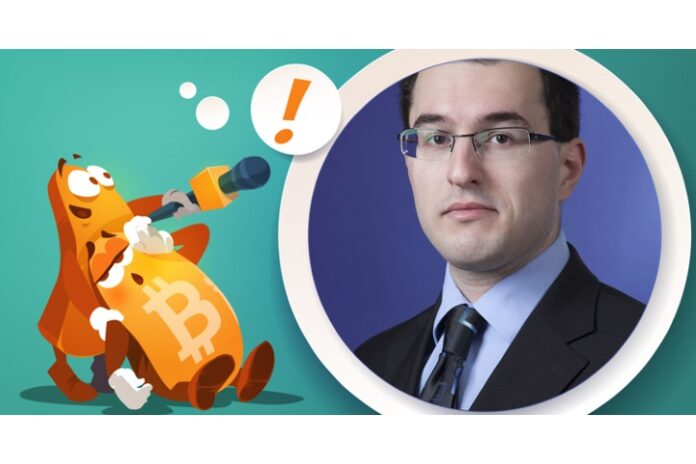The first things an investor looks at in an ICO are the correctly written and clearly formulated whitepaper, and the posts in blogs and social networks that reveal the main idea of the project. DeCenter spoke with Roman Bruskov, a professional translator and editor of crypto projects, such as DeHedge, AdHive, Ubex, and Even Dex, and found out how to correctly outline ideas and explain the essence of a blockchain project.
Roman, what education did you receive? What did you do before you started writing texts for crypto projects?
I am an economist by my first degree, and a linguist by my second higher education. I graduated from Haigazian University in Beirut (Lebanon). I am fluent in five languages, English, Russian, French, Armenian, and Arabic. I have been teaching languages for about twelve years. I have also worked as a PR director in two very large legal companies. Therefore, my spectrum of work is quite broad. And I have been working with blockchain for three years. I hold different positions in various projects, from Editor in Chief to copywriter and translator. I am also a translator for a data center.
Why did you want to write about blockchain? Did you catch the cryptocurrency fever?
It is because I can write well and I love English very much. I have written 16 books, five of which (Terrah Damnation, Terrah Retaliation, Terrah Tribulation, Terrah Redemption, Terrah Perception) have been published. The topic of cryptocurrency is relevant, and my brother is engaged in blockchain, so he pulled me into all of this. Then I realized that there is a demand for literate writers.
What are the responsibilities of an Editor in Chief in crypto projects?
This is a very wide range of tasks. Basically, it includes writing review articles about the project itself and the entire industry, creating posts for blogs, and so on. Sometimes, I give answers to interviews in the stead of the founders. Very often, I have to write whitepapers from scratch by myself. I write legal texts as well, such as charters, contracts, agreements, correspondence letters, and absolutely everything accompanying the project, plus everything that goes beyond the project itself.
How is your day organized? Is the schedule normalized?
There is no such thing as a normalized schedule in the crypto industry. I work from home. My working day starts at 7:30 am and lasts until 10 pm. I interact with my many colleagues via messengers, in particular, Telegram. Since I do not do anything that requires my personal presence in the office, I write all the texts without leaving my room for the sake of efficiency.
What is the most difficult part of editorial work?
Very difficult question. It depends on what kind of project I am working with because I have to cooperate with very different people. For example, in one very large project, where I am an Editor in Chief and translator, one of the founders constantly rechecks my translations through Google Translate. It is very difficult to work with those who firmly believe that Google Translate is a de facto, unquestionable, absolute, and impeccable translator because this is completely wrong. I have been working with and developing natural language processing technologies for six years, and I can tell you that Google is far from perfect as a service. But, my client was indomitable and he constantly asked me “Why does your translation not correspond to that of Google Translate?” I had to justify the results of my work by attracting an independent arbitrator, who confirmed the correctness of my translations. Of course, I overcame my emotions and decided that the work process, just like people, can have many faces and that you need to find a compromise. Because only compromise makes a man noble, and only compromise allows one to work.
In addition, it can sometimes be difficult to understand what people want, and what the task actually is. Therefore, I have to ask many times about all the details, although the developers of the project themselves could have taken care of this. I try not to look at the negative aspects. It is better to look for positivity in work. And I always find it in that I am working with a language that I really love.
Could you give some advice to developers who are engaged in writing texts for their ICO projects? What is the basis for the relationship between the customer and the editor?
The most important thing that underlies these relations is trust in the professionalism of the person you are entrusting your project to. If the customer does not trust the editor, then nothing sensible will come of this cooperation. It is better not to waste time and find the right specialist for your project.
In addition, sometimes it seems that customers believe that the translator is top full of direst cruelty and intentionally changes the meanings of posts and texts for some nefarious purpose. But this is not so. Nothing works without trust.
And the second thing that is required from the developers of the project is formulating clear tasks. Without an understanding of the subject, it is impossible to compile a qualitative text. Of course, I will ask if I do not understand something. It is better, however, to provide a list of necessary points with specific requirements beforehand. This will also determine the speed at which the work will be completed.
Could you give some advice to aspiring authors? How does one start writing in the crypto industry? Where do you find customers?
You do not need to look for customers, just start reading about the market, analyze it by yourself. After that, try to write a couple of articles and offer them to crypto editions. If your work is appreciated, then we can assume that you have a foot in the door.
How do you decide which project to work with, and which ones to avoid?
As you already know, I am currently working on several projects, DeHedge, AdHive, Ubex, Even Dex, and others. I have the same functionality in all of these projects. I edit or translate, and I write texts. I look for ways to develop myself in every project because each of them works in a different industry. And there is not one person in the world who is familiar with all industries at once. Considering that each of these projects works in its own market, I prefer to take on different projects for self- development, to learn something new, and expand my professional vocabulary.
Which project was most memorable and why?
AdHive. It is the most adequate project in all meanings of the word that I have ever worked with.
What is adequacy in ICO projects?
Adequate people work on adequate projects and there are adequate relations between such people, and that guarantees adequate execution of projects in all meanings of the word.
Adequate execution is when the project has very successfully conducted all rounds of its ICO without any conflicts and excesses. They have the most adequate team composed of first-class professionals, who properly treat their colleagues and their business. Their attitude towards me was very polite. The team gave clear tasks, and completely trusted me, for which I am very grateful to them.
You talked about speculative projects. Have you ever come across these?
There were not many of them, but, of course, there were also scammers. I quickly refused them.
How do you define whether a project is speculative or not?
It is necessary to look attentively at the statutory documents, at all the stages of the project’s development. Check the founders, talk to them. If these people do not want to get in touch, or they are not ready to provide more detailed information, if they do not have enthusiasm, then this is an alert marker.
How much does an editor earn in blockchain projects? More than on a similar position in other companies?
In principle, the salary is the same everywhere. The amounts that are indicated on recruitment websites are very relative and not immutable. Everything depends on the candidate and on how well they know the business. I started with a very average salary in the industry. When I gained experience, and I proved my proficiency, I was recommended, and I started increasing my demands.
Do you have any cryptocurrencies, do you own any, do you invest?
I prefer the good old Russian ruble.
And are you going to acquire any cryptocurrencies?
It depends on the bonuses my employers provide.
Some believe that if you write about cryptocurrencies, then you have no right not to possess some. Binance CEO Changpeng Zhao was tired of media questions about whether Bitcoin really is used by drug dealers, and is going to give interviews only to journalists who own cryptocurrencies.
I have intimate knowledge of the crypto and blockchain industry. In my opinion, no technology in the world can become profitable until it becomes convenient or useful to average people.
That is, you think that blockchain is currently an inconvenient technology?
I can count on the fingers of my two hands the projects that can truly be used by ordinary people. Look at the market, and you will see 90% of the projects are scams.
Survival of the fittest?
The fittest in what sense? Either they are demanded on the market, or they conduct good marketing campaigns. These are two different things. Marketing and convenience are difficult to combine. There is the concept of “long-term marketing,” when the project knows that it will live on for a long time, that the project has a specific application in the market, and that it will be used in everyday life. And there is the notion of “short-term marketing,” which is to quickly raise money and see whether the project will work out or not. Big difference.
You said that you can count on your fingers the projects that inspire trust, who have a future. What are these projects?
I will refrain from giving names. But they are connected with production because production is the cornerstone of any economy. If there is no production, then there is no economy. Or it will be very vulnerable. Because if the economy is not based on exports, but on the provision of services, the entire system can collapse in the blink of an eye.
Can blockchain technology be used in Russia to improve the economic system?
If we have the right legislation for these technologies, then, of course, they will find their application. At the moment, we have no legal justification for the entire new economic system, and this is a strong brake on the development of blockchain. After all, many are afraid and do not know what will happen tomorrow. If there is a clear understanding of the ICO market, then there will be an incentive for development. The president made it clear that a technological breakthrough is the only solution to the problem of the Russian economy. I agree with him completely. Even the state itself can easily create its own blockchain systems at enterprises without resorting to the use of cryptocurrencies. Regulation is necessary, and given the amount of deception that exists now on the market, there will be chaos without legal responsibility.
In your opinion, how will the crypto industry develop?
Blockchain technologies are at the dawn of their development, they are imperfect, and are still being probed. Now the industry relies on the number of available miners and nodes. In general, the industry will develop, but not at such an accelerating pace as it is now. As soon as regulation appears, the elements of speculation and thirst for quick profits will vanish instantly.
Roman Bruskov is an expert editor, communications specialist and author of multiple books and articles on blockchain topics, and has many years of experience in various industries.















